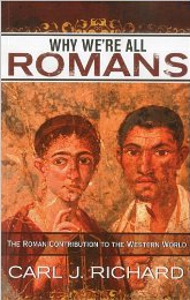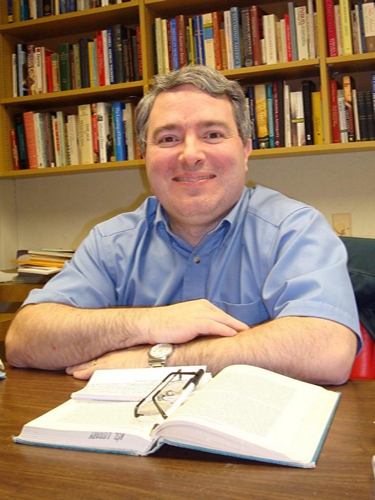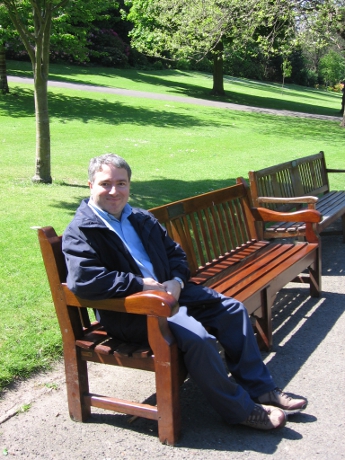- Why Did The Founding Fathers Study The Fall Of The Roman Empire?
- Why Do Civilizations Fail?
- Why Did The Roman Empire Fail?
Full Interview Audio

Personal Info
Hobbies and Interests:Writing books, reading, traveling to historical sites
Sports Teams:New Orleans Saints
Favourite Books:
- The Radicalism of the American Revolution by Gordon S. Wood
- American Slavery, American Freedom by Edmund S. Morgan
Most Influenced By: Reinhold Meyer, Gordon S. Wood
Company Website: http://www.history.louisiana.edu/Carl%20Richard%20page.htm
Interview Highlights
This is a condensed, lightly edited transcript of an audio interview. The full audio is available and highly recommended. The interviewee may post clarifications in the comments.
Adrian Bye: Today I’m here with Professor Carl Richard who is a history professor. He’s here to talk to us about the Fall of Rome and hopefully some of the dynamics on why those might happen. Thank you for joining us.
 Carl Richard: Thank you for having me.
Carl Richard: Thank you for having me.
Adrian Bye: Why don’t you tell us a little bit about who you are and your background?
Carl Richard: I’m originally from Louisiana, which is where I teach now. This was my Alma Mater as an undergrad. I got my Ph.D. at Vanderbilt University. I always had an interest in the ancient world, Greece and Rome. I had the Greek and the French, but I didn’t have the Latin and the German. I was a very impatient young man, and I was going to have do all of this tremendous language work to even get started. So I decided to go into American history. My Ph.D. is actually in American and Intellectual History. I was interested in the Founding Fathers and the American Revolution, and so my mentor, Paul Conkin suggested, Why don’t you do the Influence of Greece and Rome on the Founding Fathers? Actually, that was my first book, The Founders and the Classics, was published by Harvard University Press in 1994. I became more and more interested in the ancients doing that work. Some of my books have been geared towards the influence of Greek and Rome in the western world, including the United States, and others have been more about the ancient world itself.
Adrian Bye: This past weekend I went to visit Monticello, Thomas Jefferson’s house. I would suggest that Thomas Jefferson might have been America’s first geek.
Carl Richard: He was an incredible man. He was a great scientist and inventor. He invented an odometer for his carriage that measured the mileage. He actually invented the rolled-out map. He invented a sort of a primitive copy-machine. He is often portrayed as this forward looking man which he certainly was. But he was also very well educated in history, especially in Greek and Roman history.
Adrian Bye: There was a book by Edward Gibbon published in 1776 on the Fall of Rome that was highly influential. Was Thomas Jefferson the main guy, or were there others that were also reading that and basing the Founding Documents on that book?
Carl Richard: Jefferson was exceptionally well educated, but actually most of the Founders were steeped in Greek and Roman history because that was their educational system. The so-called Grammar School, which I always thought referred to English Grammar, did refer to Latin Grammar. They studied Greek and Latin, but especially Latin for years and years and then went to college and studied usually for three more years. It really influenced the American Revolution because they saw themselves as recreating the ancient republics. They were almost all steeped into the classics. They were especially interested in the late Roman Republic because here they were establishing a new Roman Republic. They even used Roman architecture for the capitol; they used names like the senate for the upper branch. They were trying to recreate the Roman Republic and so they were very much concerned with what is it that killed the original Roman Republic. I would say they were more fascinated by the fall of the Roman Republic than they were by the fall of the Roman empire. Those two things were separated by five centuries. When they talked about the Fall of Rome they didn’t mean the empire, they meant the Republic.
 Adrian Bye: I grew up as a reasonably well-educated person. I’d heard of the idea of the Fall of Rome. I went to Angkor Wat in Cambodia a year and a half ago, and I’m aware that there is Machu Picchu and all these other cities around the world, but had never given any thought whatsoever that there might be specific reasons why all these societies had actually failed.
Adrian Bye: I grew up as a reasonably well-educated person. I’d heard of the idea of the Fall of Rome. I went to Angkor Wat in Cambodia a year and a half ago, and I’m aware that there is Machu Picchu and all these other cities around the world, but had never given any thought whatsoever that there might be specific reasons why all these societies had actually failed.
Carl Richard: I think in the Founders’ generation, back during the Enlightenment in the 18th century, they thought very much in terms of lessons of history. That societies repeated certain mistakes and that if we could learn from this prevent our own society from falling as a result. They tended to be sometimes a little naïve and trying to apply lessons from one time to another. But I think we’ve got the opposite extreme in academia today where we talk that all cultures are completely different and therefore you cannot learn any lessons. In fact, they hate this term of learning lessons because they think it’s naïve. But I think they go too far in that direction. There certainly is a common human nature and therefore there are common human problems and common responses to those problems. Because there is a common human nature we can learn from ancient societies and other societies. We do have to be careful because there are differences in historical context, but I think we can learn.
Adrian Bye: There is a book by Joseph Tainter, The Collapse of Complex Societies. His general thesis is that societies reach a level of complexity and the costs of continuing to the growth of this society outweighs the costs of continuing to run it. So at some point people scatter. You can do things to increase those costs on the system. For example, communism is a way to increase the costs of keeping the society and that will make it fail faster. Me being quite right-wing, I would put all left-wing movements into fairly expensive in terms of keeping the system running. Would you agree with that?
Carl Richard: I do. Government, to some extent, is parasitical. It can only exist in a society that is producing wealth, and the wealth does not come from the government. It comes from private enterprise. If you tax private enterprise too much you’re killing the goose that’s laying the golden egg. When I say tax, it’s not just taxes but regulations. I read somewhere that businesses in America are spending now twice as much money to comply with government regulations as they are spending in taxes. That’s a tax. Every time the government says you must do something and it costs you money to do it, that’s a tax. I think the private enterprises in America are taxed tremendously right now.
Adrian Bye: Can you talk a little bit more about the influence of Rome on the Founding Fathers? What kind of things really stuck out to them, and what kind of things did they embed in the Founding Documents of the United States?
Carl Richard: Maybe the most important thing structurally was this idea of mixed government. This went back to the ancient Greeks. But, as in so many other cases, the Romans were the ones who actually made it work and gave them a model. A mixed government was this theory that the best form of government would balance the power of the one, the few, and the many. The one being the king, the executive or the leader; the few being the rich, the well-born; and the many being the masses. Plato said if you give all the power to one person or group, they will abuse it. And so the one, the few and the many each have to have a veto basically. The Greeks talked about this, but they didn’t really come up with a great model that could be followed. The Romans did. The Roman Republic basically had a balance between one, actually the two consuls or executives; then they had the senate, which was the aristocratic body; and then they had the popular assemblies, where the masses could make their voice heard.
 When the Founders got together in Philadelphia to construct the Constitution, they said we want a mixed government just as the Roman Republic had. So they created a king, the president. And then the senate. They even gave it the same name as the Roman aristocratic body. They were given these six year terms, they insulated them from mob pressure so that they could be this sort of aristocratic body. And then the House of Representatives, which was directly elected every two years. That was to be the organ through which the mass will would be heard. They created a system that was like the Roman system based on this classical theory of mixed government.
When the Founders got together in Philadelphia to construct the Constitution, they said we want a mixed government just as the Roman Republic had. So they created a king, the president. And then the senate. They even gave it the same name as the Roman aristocratic body. They were given these six year terms, they insulated them from mob pressure so that they could be this sort of aristocratic body. And then the House of Representatives, which was directly elected every two years. That was to be the organ through which the mass will would be heard. They created a system that was like the Roman system based on this classical theory of mixed government.
Adrian Bye: But the Roman system failed.
Carl Richard: Indeed, all systems eventually fail. And they knew that. They knew the Roman system failed and so they were almost obsessed with conducting what I would call an autopsy on the Roman Republic to find out what killed it. But they didn’t think mixed government killed it. They thought mixed government made it strong. It was other things, corruption and various other factors, that caused the Republic to fall.
Adrian Bye: What were the factors that they did think caused Rome to fall?
Carl Richard: Corruption, or what they would call moral decline. This is something that we’ve seen in every level. People were becoming more corrupt on all levels; farmers were losing their land, or voluntarily leaving their land in some cases, and moving to the cities where they were becoming sort of mobs. The government was trying to placate them with the dole, very much like the modern food stamp program. The masses were getting corrupt and so were the aristocrats. One of the things the Founders emphasized was the corruption at all levels in human society. The early Roman Republic that the Founders revered was based on various virtues, as the Founders called them. The early Romans were very religious, pious they would say, they were hard-working, just like early American settlers were. They were frugal, they saved their money; self-discipline. They had a lot of the same qualities. In the late Republic they lost these qualities. They had lost all the virtues that had made them so successful. The Founders were worried that the same thing would happen in America. And I would argue, in our own time a lot of that has happened.
Adrian Bye: One of the things from the Gibbon’s book is that the Romans became quite effeminate. Do you know why that was?
Carl Richard: The term effeminate was used by the Romans and the Founders to mean the quality of luxury, because there was this classical idea that luxury was a feminine thing. Early Romans were these hard men, tough, working, and so on. Another thing that was called feminine was being dependent on someone else. A real man was someone who was independent. It’s interesting, the very word virtue which the Founders loved to use and spoke about a lot, that’s a Latin word. The word virtue actually comes from the first three letters vir, and vir in Latin is the word for man. So when they spoke of virtue they spoke of manly qualities. The Romans and the Founders were afraid of men losing their manly qualities that they believed were crucial in society.
Adrian Bye: In the US today there is a fear that things could go bad. I don’t hear much talk about comparing it to the Fall of Rome. We think that we have democracy and things will just continue to work. But we’re relying on the ideas of people two hundred plus years ago, and they are untested. We don’t know if they’re gonna work.
 Carl Richard: I think it depends on what you mean by untested. I would say it was tested for two centuries and worked pretty well. It’s only recently that it’s declined. I certainly don’t think that we’re at the point where Rome was right before it fell. But I think we may be in a kind of the late imperial period unless we are able to correct our problems. Certainly, we’ve had our problems with debt for decades but it certainly has accelerated, a lot of these things have accelerated. The problem is as each year goes by, it becomes harder and harder to reverse course. For instance, the Roman government in the late years engaged in this extremely excessive spending. How did they pay for these things? There are two methods. One is taxation, and taxes got higher and higher. The other one was devaluing the coinage. They couldn’t do the third one, which is debt, because the banking system wasn’t big enough to support the Roman government. So they used the other two means. They devalued the currency so badly that by the end of the empire the so-called silver coin was only two percent silver and the Roman government would no longer accept their own money as taxes. You had to give goods to the taxman. We are not at that point yet, but certainly the Fed has created over two trillion dollars in money in the last few years. And of course we have high taxes, we also have high debt. So we’ve got all three. It’s not at the point they were at the very end, but it’s getting there.
Carl Richard: I think it depends on what you mean by untested. I would say it was tested for two centuries and worked pretty well. It’s only recently that it’s declined. I certainly don’t think that we’re at the point where Rome was right before it fell. But I think we may be in a kind of the late imperial period unless we are able to correct our problems. Certainly, we’ve had our problems with debt for decades but it certainly has accelerated, a lot of these things have accelerated. The problem is as each year goes by, it becomes harder and harder to reverse course. For instance, the Roman government in the late years engaged in this extremely excessive spending. How did they pay for these things? There are two methods. One is taxation, and taxes got higher and higher. The other one was devaluing the coinage. They couldn’t do the third one, which is debt, because the banking system wasn’t big enough to support the Roman government. So they used the other two means. They devalued the currency so badly that by the end of the empire the so-called silver coin was only two percent silver and the Roman government would no longer accept their own money as taxes. You had to give goods to the taxman. We are not at that point yet, but certainly the Fed has created over two trillion dollars in money in the last few years. And of course we have high taxes, we also have high debt. So we’ve got all three. It’s not at the point they were at the very end, but it’s getting there.
Greece and Rome were very religious societies, especially Rome, but their religion was very different from the Judeo-Christian religions. It was very exterior. You did your sacrifices, you did what you were supposed to do and hope that the Gods would be pleased with you and favor you. But it was not at all tied with belief. The very well-educated people were into stoicism and other philosophies. There was some commonality with Christianity which I think helped Christianity spread among the upper classes. For instance, in stoicism there is a belief in a kind of an afterlife. When you’re born your soul comes from the world soul, and when you die it goes back, which is a kind of afterlife. Gibbon blamed Christianity for the fall of the Roman Empire because early Christianity was very much inwardly focused. Great minds like St. Augustine, for instance, if he had not been a Christian, he probably would have been in government. So you have all these Christians sort of retreating from society, looking inwardly, looking toward the next life as opposed to this life. Gibbon believed that was one of the main causes of the fall of the Roman empire. Christianity took all these great minds out of Roman society, they become these sort of celibate priests, bishops living outside the system, and in Gibbon’s mind not really contributing to the system.
Adrian Bye: Thank you very much for doing the interview.
Carl Richard: Thank you.









